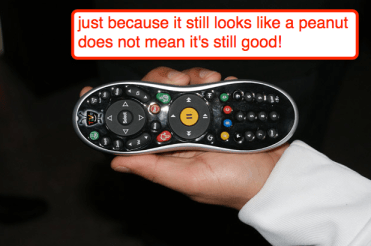
Tomorrow morning you’re going to see a lot of headlines across your favorite tech blogs that will sound a little… extra-ordinary. Small companies seemingly acquiring big companies. Well-known individuals joining startups or other odd-fit engagements. They will be, for the most part, well written. And to a few dozen people (specifically: the writer, the writer’s best friends, and the named individuals in the blog post), fairly funny. To everyone else? Smirk-worthy, at best. Why? April Fool’s – a fun day to pull pranks. That is, if you are either extremely clever and funny, or you are an 8-year-old. And I hate to say it (not really), but this basically rules out just about the entire techie blogosphere.
That’s pretty much it for my thoughts on the subject. You’ve been warned.
JT the Curmudgeon, out.
ps – in order to provide anything entertaining or somewhat related, here’s Wired’s Top 10 April Fools’ Pranks for Nerds. enjoy.







 Sound like a schmuck. Per the above point, you never know who is going to see the words you write. Your “witty banter” with an old high school friend on Facebook might not sound so clever to a potential employer. I’ll be the first to admit that I am a cynic and an outspoken one, and I am certain this colors peoples’ opinions of me. But I also do my best to sound objective and educated about whatever topics I’m talking about. While I’m sure I’ve tweeted things I shouldn’t have, or left comments on blogs that could be misconstrued, I generally make a concerted effort to consider my commentary and how it would be interpreted by a complete stranger (though I could still use improvement myself).Why shouldn’t you do this? Your words will come back to haunt you – how about just not saying them in the first place?
Sound like a schmuck. Per the above point, you never know who is going to see the words you write. Your “witty banter” with an old high school friend on Facebook might not sound so clever to a potential employer. I’ll be the first to admit that I am a cynic and an outspoken one, and I am certain this colors peoples’ opinions of me. But I also do my best to sound objective and educated about whatever topics I’m talking about. While I’m sure I’ve tweeted things I shouldn’t have, or left comments on blogs that could be misconstrued, I generally make a concerted effort to consider my commentary and how it would be interpreted by a complete stranger (though I could still use improvement myself).Why shouldn’t you do this? Your words will come back to haunt you – how about just not saying them in the first place?



